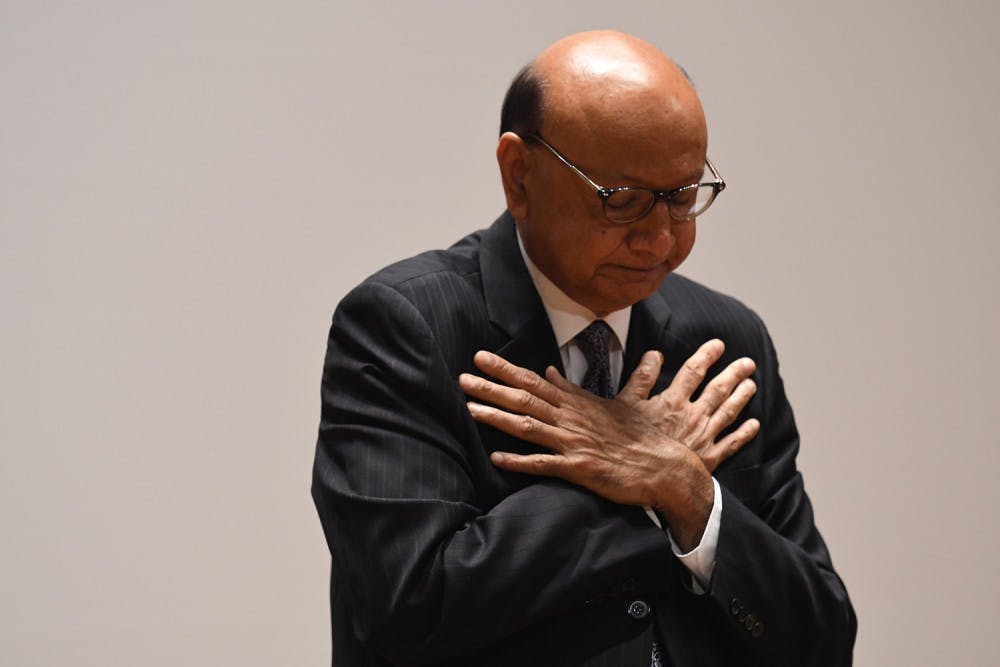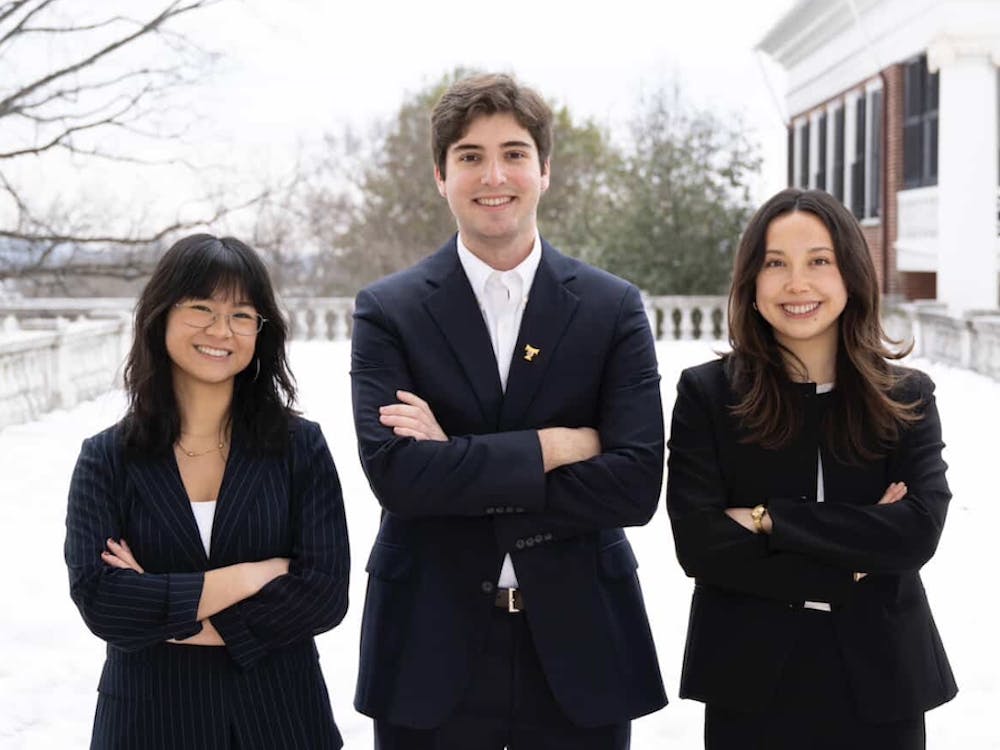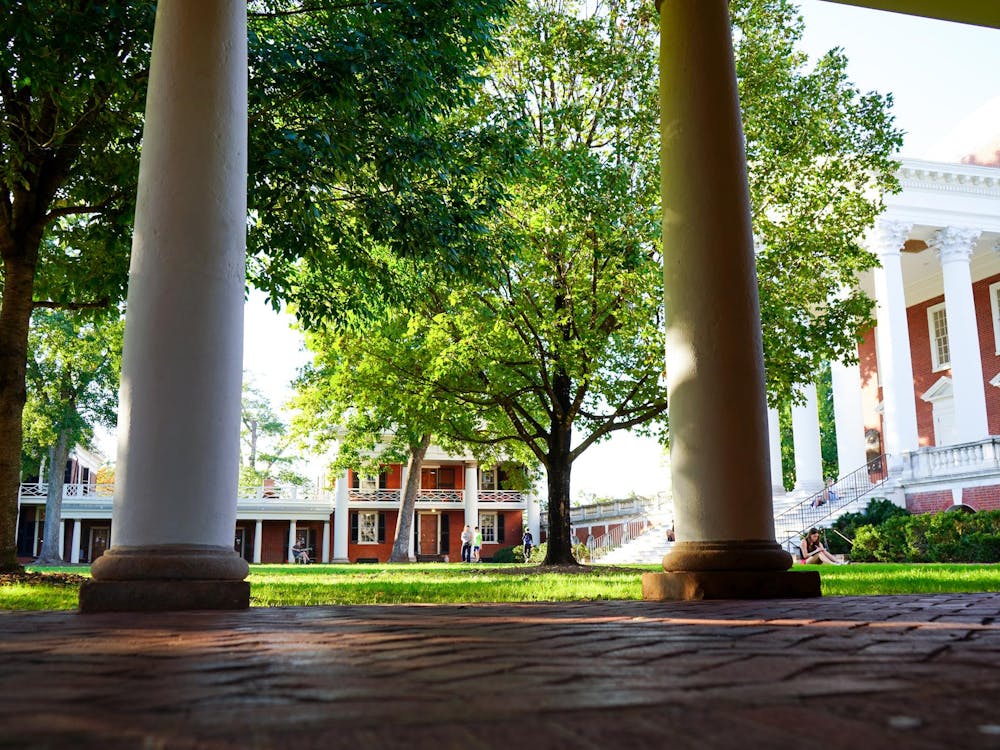“We only conclude — Mrs. Khan and I — that we were blessed to have him for 27 years,” Khizr Khan said of his son, late Army Capt. Humayun Khan, in an interview with The Cavalier Daily.
“In those 27 years people would think that we may have taught him a thing or two. Not at all,” Khan continued. “He taught us. He continues to teach us. And it was under his spirit — under his grace — that we continue to stand up again and again and again.”
Humayun Khan — a College graduate who attended the University from 1996-2000 before joining the United States Army — died while serving in Iraq in 2004.
Khizr Khan spoke with The Cavalier Daily at the Miller Center, which hosted him Tuesday for a private taping of the show “American Forum” and for a public event at Old Cabell Hall.
At both events, Douglas Blackmon, Miller Center director of public programs and host of “American Forum,” interviewed Khan about his experience as a Muslim-American and what led him to make his now-famous speech at the Democratic National Convention this summer condemning Donald Trump’s comments about banning Muslims from entering the United States.
The making of a public figure
Khan told Blackmon he originally wrote six pages of content for what was meant to be a 2-minute speech at the DNC, prompting laughter from the audience at Old Cabell Hall.
Khan said his family is normally deeply private, and both his sons cautioned him against the pushback he would receive after delivering a speech at the DNC. However, the fear the election’s rhetoric had been instilling in children moved Khan to speak, and he said since the speech the positive reactions he has received from others have inspired him.
Pausing to gain his composure, Khan told the audience he and his wife received a message after speaking at the DNC from a group of fourth graders that read, “Can you stop Donald Trump from throwing our friend out of this country? We will do anything to make sure that she’s not thrown [out], we love her very much.”
Following a series of subsequent public appearances, Khan received a card from the same four children that read, “Thank you very much for protecting our friend. She knows now that she will not be thrown out.”
Khan said stories such as these are the reason he continues to speak publicly about his experience and role as a Muslim-American citizen.
Attendees applauded after Khan told this story, many with tears in their eyes.
Khan told The Cavalier Daily a Hispanic woman approached him while in Washington, D.C. to tell him about how he influenced her young son when facing discrimination.
“She said, ‘I have a 7-year-old son,’” Khan said, pausing, “And she says that, ‘Whenever he's bullied in school he comes back and he watches your speech.’”
The mother told Khan that after her child’s class watched the speech together, the bullying stopped. If he only helped that one child, Khan said, his efforts have worked.
In the question and answer session at Old Cabell Hall, many participants expressed gratitude toward Khan and his family. One community member stepped forward with her two children to thank him for being a leader for Pakistani-Americans like herself.
“I brought them here so they can see,” she said. “They can see how proud we are of you and all the ideas and generosity you have, and how you have represented the Muslim world.”
Community member Linda Parker, who attended the private taping, called Khan “remarkable.”
“I was honored that I was able to meet him,” Parker said. “I didn’t know I would spend most of the presentation fighting back tears.”
“This was one of the best things we’ve ever done,” Miller Center Managing Editor Howard Witt said of Khan’s interview.
Khan also called on all Muslim-Americans to become more involved in political activism in the face of terrorism domestically and abroad.
“You must denounce terrorism, you must denounce violence,” he said.
Referring to recent instances of graffitied hate speech at the University, Khan said “this institution is worthy of better.”
“That is not what the values of the University of Virginia are,” he told The Cavalier Daily.
A U.Va. family
At both events, Khan spoke positively about his son’s time at — and his family’s connection to — the University.
“It was so cool to see how much he revered U.Va. and respected the students, and really cherished the time his son had at U.Va.,” Batten graduate student Sumedha Deshmukh said.
Khan said the University’s values, and the values of its founder, resonated with him and his family.
“I fell in love with the United States Constitution as soon as I read the Declaration of Independence,” he said.
Khan told The Cavalier Daily he took his oldest sons — Shaharyar and Humayun — to see the monuments in Washington, D.C. when they first came to the United States. He said when the family saw the words inscribed in the Jefferson Memorial, they were “in awe.”
In later years, this may have influenced Humayun. While drafting his admissions essay for the University, Khan said he noticed his son had stacks of books about Thomas Jefferson in his room.
Khan said his son told him he felt his three best decisions were to attend the University, to join ROTC and to commission into the army after he graduated.
While at the University, Humayun would talk with the ROTC cadets in and outside of his classes and enjoyed their sense of honor, Khan said.
“He told us before signing up for the ROTC that, ‘I feel with them in my element,’” Khan added. “He felt so connected with that discipline, with that dignity.”
Khan emphasized the values instilled in his son while he attended the University, and how those values shined through until his death in Iraq.
“We gave a high school graduate to this institution — to this University. The rest of him was made right here,” he told The Cavalier Daily.
Humayun took his last steps deliberately to save others, he said.
“That day what he learned under the walls of this institution — caring for others — came all together,” Khan said. “He showed it to us and to the rest of the world. That is what caring for others means — if you have to stand up and face danger, you do it without hesitation.”
The Khan family moved to Charlottesville after their son’s death. Of Grounds, Khan said, “Whenever things are a little darker, that's where we come.”
“We come to see the light," he said. "We come to see the bright faces and our future leaders that will lead us in a better direction.”
Khan said he and his wife, Ghazala, often walk to Clemons Library, behind which a garden is situated with a bench dedicated in the name of their son. The inscription reads, “From friends of Capt. Humayun Khan, whom he honored with his friendship.”
The audience at Old Cabell Hall gave Khan a standing ovation before and after he spoke. Khan thanked the University students present — whom he referred to as “our future leaders” — for their support. Of his son, he said, “Whenever I look at this crowd, I feel as if he is sitting among them.”







